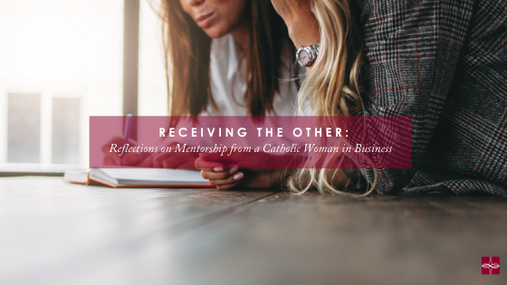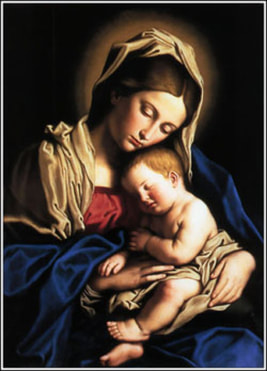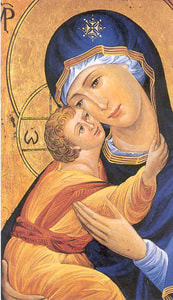|
I stumbled into entrepreneurship in 2016 after studying philosophy, theology, and anthropology for my undergraduate and graduate degrees. Ending up in the business world felt like a long and winding road filled with sleepless nights, much discernment, and many conversations. In the few years after graduating from college, like many early 20-year-olds, I felt untethered and unsure of my direction. What was my direction in life? What was my mission? How did the Lord want me to use my gifts and talents to serve him? At the time, I attempted to answer these questions by searching for women who had accomplished work in the same field that I was going into. I spent endless hours looking for women on LinkedIn in their 40s and 50s who had achieved a successful career while also being married and raising a family. My search was futile. Although I did find a couple of single Catholic female entrepreneurs to connect with, for years, I felt like I was “making it up as I went along”: trying to weld married and family life while scaling a business, hiring and firing employees, serving clients, and trying to keep God in the center of it all. Every vocation for women within the Church is beautiful and worthy, but being a Catholic entrepreneur in particular has been challenging. Although I have developed some great friendships with secular business women, I can’t connect with them fully about discerning business decisions with my spiritual director or praying a daily rosary for my employees. Within the Catholic sphere, I can’t completely relate to stay-at-home mothers or women who are working a 9-5. I desperately needed a mentor but could not find one who was willing to devote time and effort to my growth. Speaking to women’s particular vocation, Pope John Paul II in Mulieris Dignitatem spoke to every woman’s calling to love: “The moral and spiritual strength of a woman is joined to her awareness that God entrusts the human being to her in a special way. Of course, God entrusts every human being to each and every other human being. But this entrusting concerns women in a special way - precisely by reason of their femininity - and this in a particular way determines their vocation”. Here, Pope John Paul II illuminates women’s ability to “receive the other” because of the design of their femininity. Through their motherhood, spiritual and physical, women are capable of receiving, knowing, and loving others in a manner different to men. God entrusts humanity to women, knowing that she is uniquely made to care for those around her. This act of entrusting carries through to every aspect of our modern world, including the sphere of business. Just as a mother nurtures her family, every woman in business has the mission to nurture those in her care: her clients, her employees, her colleagues. In a special way, Catholic women entrepreneurs co-create with God to create something out of nothing. Every woman-owned-business begins as merely a dream placed on her heart. Her mission is to share with the world her services and products—glimpses of God’s own heart and a genius that only she can share. This is why mentorship is essential: so that women who are called to practice business can find and live out their own unique mission in this world. Women are called to cultivate the gifts and talents of others, to foster the dreams that only they can bring forth. A mentor provides guidance, critique, and reassurance as a young person matures. This is crucial to the formation of any woman, entrepreneur or not, but also fulfills the role of each Christian to evangelize the world. Without this relationship, one might not have the tools and resources to realize their full potential. By fostering the gifts and talents of others through mentorship, women are living out their feminine genius. My Co-Founder, Emma Moran, and I created Catholic Women in Business in 2018. CWIB is an online resource of Catholic women who are seeking to live a life of faith while striving for excellence in their careers. We hope that it’s a space for women to cultivate mentorship and connection. My dream is to initiate a movement where there is more mentorship available within the Church, for women and men. In encouraging these relationships, I believe we will be able to activate the missions of those within our communities, answer the Church’s call to a New Evangelization, and to bring forth the Gospel into our society.
1 Comment
Today we celebrate the Solemnity of the Blessed Virgin Mary, Mother of God. As I thought about the many lessons we can learn from our Blessed Mother, I found myself particularly drawn to wondering what it means to be a woman of faith. I’m sure there are many others who have pondered this same idea. Sometimes, I think about how the 21st century seems to illuminate women through a lens of conformity, threatening our truest femininity with negative connotation and making it seem “okay” to expect less of ourselves and of others. Many young women are faced with the struggles of understanding themselves according to how others perceive them, never knowing how to love themselves for who they really are.
Women are faced with the struggles of figuring out what it means to be a woman. We are told in different ways all around us that we are not smart enough or too intimidating, that we are not thin enough or too fat, to flaunt ourselves is to respect ourselves, in order to “get a man” we need to do x, y, and z. I offer a different perspective: womanhood is beautiful and blessed thing that proves we are the crown of creation by God the Father. My role as a Catholic woman is to support and love those around me with unfailing resilience and without ceasing. In the Catholic Church, there is one woman who rose above all difficulties and strife because she said, “Yes.” Mary the Mother of God is a perfect model of holiness and willful obedience to God, and a shining example to womanhood. When betrothed to a man she loved, she faced persecution and rejection from those around her. She knew others would judge her and they would criticize her, but she held true to her “Yes” and bore the Son of God. In our lives, what do we do when others look at us with disgust or with judgments? Can we not choose the higher road and be the person God wants us to be, regardless of what others may think of us? Mary certainly did. It is hard to swim opposite the current at times. Standing up for our virtue is something that most women find difficult or have never heard of before. As a woman of faith, I know that my responsibility to God and to myself is to love Him and love myself. God knows my most intimate thoughts and feelings and he will never leave me. When I’m feeling alone, disappointed, discouraged, scared, or disrespected there will always be one who will stand by me until the end, and that one is Jesus. What does it mean to be a woman of faith? It means to love above all else, understand that you are a precious creation, and that you are loved dearly by God himself. Krissy Kirby is a teacher for the Archdiocese of Washington. Have you ever wondered about women and their place in the Catholic Church? I have. When I was little, I wanted to be the Pope (before I decided my dream was to become President, of course). Only then did I discover that since I was a girl, I could not become the Pope. That infuriated me as a small child, and sparked my interest in learning more about my life’s vocation as a woman of faith. Only as I have grown older have I begun to learn how I can actively participate in my faith traditions, as a layperson and as a woman.
Women have a role in our faith. We are witnesses and called to be exemplary versions of ourselves. We are called by Christ to function in our Church using our own gifts, talents, and love. The example of women leaders in our Church shines through to us in the lives of many female saints and other women in our Church who used their femininity to do God’s will. We read about Mary Magdalene, Martha, and Mary who were friends and followers of Jesus and who were with him throughout his ministry on earth. Later in the 14th century we see St. Catherine of Siena, who helped bring the papacy back to Rome. St. Clare of Assisi founded the female religious order similar to Franciscans. St. Therese of Lisieux is a Doctor of the Church, thanks to Blessed Pope John Paul II. These women and countless others have made their mark on the Church in critical and defining ways, allowing other women to look up to them and see how to live out God’s love through actions and service. In Mulieris Dignitatem, a 1988 apostolic letter by Blessed Pope John Paul II, he says, “Holy women are the incarnation of the feminine ideal.” This tells us to follow the example of the holy women in our Church, who taught us all a great deal about the special place women hold. The New Evangelization needs women to be examples of true womanhood. What is a true example of womanhood, you might ask? Who do we look to for guidance? Well, Mary, the Mother of God is a perfect place to begin. In the Blessed Mother, we see a sinless woman, courageous and steadfast in her faith, who said the ultimate “Yes” to God at a young age. In the face of adversity and rejection, she showed how strong her faith was by bearing the Son of God and then delivering her child in a stable. No simple feat! Throughout Jesus’ life, she was with him, both in person and in prayer. When he was lost and teaching in the temple, she worried like any mother would about her son, then pondered these things in her heart; at the Wedding of Cana, she knew when he needed a nudge to begin his ministry; at the foot of the cross, she wept for the life and humanity of her son. As a woman and a mother, we see Mary’s grace and strive to imitate her desire to do the will of God, unwavering in faith and holiness. As true, confident, feminine examples of love and generosity, we need to know and understand Church teachings and desire to do more as laity in our Catholic faith. As individuals we are a part of the Body of Christ, with an important responsibility to love and with incredible opportunities at the end of our fingertips. Mulieris Dignitatem encourages us—women of faith—to deepen our own understanding about ourselves, and be a witness of faith. We must recognize that our vocation is to understand and teach the faith, to evangelize the world, to desire to grow ever more deeply in Christ’s love, to care for the poor and destitute, and even to answer the call to religious life. But, the most important of these things is to love unconditionally. As Blessed Teresa of Calcutta said, “Not all of us can do great things. But we can do small things with great love.” In our faith today, we sometimes see people questioning where and how women should participate in our faith and its traditions. This is an issue that many on both sides of the spectrum feel strongly about. The New Evangelization is a way for all people who are members of the Body of Christ—especially women—to reconnect with God and to rekindle the desire to live our lives to their fullest potential. Krissy Kirby is a Senior at The Catholic University of America and a Resident Minister through the Office of Campus Ministry. When I think of role models for Catholic men, I think of St. Joseph, St. Christopher, St. Thomas More, St. Vincent Pallotti, and men in my life like my father, grandfather and even certain professors. When I think of who teaches me best about how to be a Catholic man, I think of Mary. Now, before you laugh, let me point out that Mary can be a source of both masculine and feminine spirituality. Typically, Mary is viewed primarily as a role model for women. So what can Mary teach Catholic men about our faith and how to live our lives today?
First, Mary is introduced to us in the Gospels when an angel appears to this timid young Jewish girl, and addresses her, “Hail, favored one! The Lord is with you” (Luke 1:28). Immediately, we can tell that the life of Mary is deeply intertwined with the love and charity of God. How is it that a young woman managed to achieve such favor with God? Or maybe to phrase it in another way, what is it about Mary that made God choose her? The Old Testament is filled with stories of women answering God’s call. Sarah, Hannah, Deborah, Ruth, Judith and Esther are just a few of the many that could be named here. They all paved the way for Mary’s role in the Incarnation. “Mary stands out among the poor and humble of the Lord, who confidently hope for and receive salvation from Him” (CCC #489). Throughout salvation history in the Bible, God constantly chooses the weak to lead the strong, men and women alike. This choice of God goes against what society often tries to tell us as men. Society tells us that men should be brutish with no need for a Savior because we can “do it on our own.” Mary stands out among all believers because of her eagerness to do God’s bidding. It is her desire for God, not independence, which brings her closer to God. Mary exemplifies complete obedience in God and submits herself to his will. In saying “yes,” Mary showed us a unique holiness. While God chose Mary from her conception, she was still given the opportunity to consent to God. Many Catholics today have the fear of speaking about faith in public. What if faith wanted to manifest itself in you? That may be shocking to think about, but the obedience of faith that Mary professed is what revealed her grace to us. As men, we look to Mary for strength and as a witness to doing the Lord’s will under immense pressure. Jesus Christ, fully God and fully human, came from this humble woman. Mary’s love, grace, and faithfulness brought Christ into this world. Mary’s choice brings us closer to Christ’s humanity. While Christ is the Son of God, he is also the Son of Mary. This helps us to come to know God and build our relationship with him. By better understanding Mary, we can better understand Christ. Mary is key to God’s plan. The willing “yes” became the center of our faith. God did not need to wait for Mary’s acceptance, but her consent was vital for the birth of the Church to come out of love, charity, and grace. It is for that reason that “Mary is the symbol and most perfect realization of the Church” (CCC #507). Her “role in the Church is inseparable from her union with Christ” (CCC #964). For these reasons, Mary serves as the model for how the Church should practice faith and charity. She is the model servant of God for both women and men. As members of the Church today, we can look to her for the attributes of obedience, faith, hope and burning charity as a way to lead more masculine lives. Instead of feeding of off the stereotypes of what men should be, we can turn to Mary for direction on how to live our lives according to God’s plan. She is an “advocate and helper” for us all (CCC #969). The “Blessed Virgin’s salutary influence on men…flows forth from the superabundance of the merits of Christ” (CCC #970). Mary advocates for us and helps us to come to know Christ. Our prayers to Mary extend beyond praying to a humble woman, in praying to Mary, we acknowledge our faith in the Incarnation in Christ and the sacrifice Christ made because he loves us. By praying to Mary, we can come to understand how much both Mary and Jesus Christ love each of us. It is our duty to have faith in Christ through Mary. In doing so, we can become true men for God, and not simply men chasing our own ambitions. Mary accompanies us on this pilgrimage of our faith (CCC #972). She intercedes for us in our attempts to know Christ, and just because we are men does not mean that we cannot try to become more like Mary. Thomas Coast works in the Diocese of Manchester, New Hampshire and is working on his M.A. in Theology through the Echo Faith Formation Program at the University of Notre Dame. |
Details
Archives
July 2024
Categories
All
|
About |
Media |
© COPYRIGHT 2024 | ALL RIGHTS RESERVED






 RSS Feed
RSS Feed